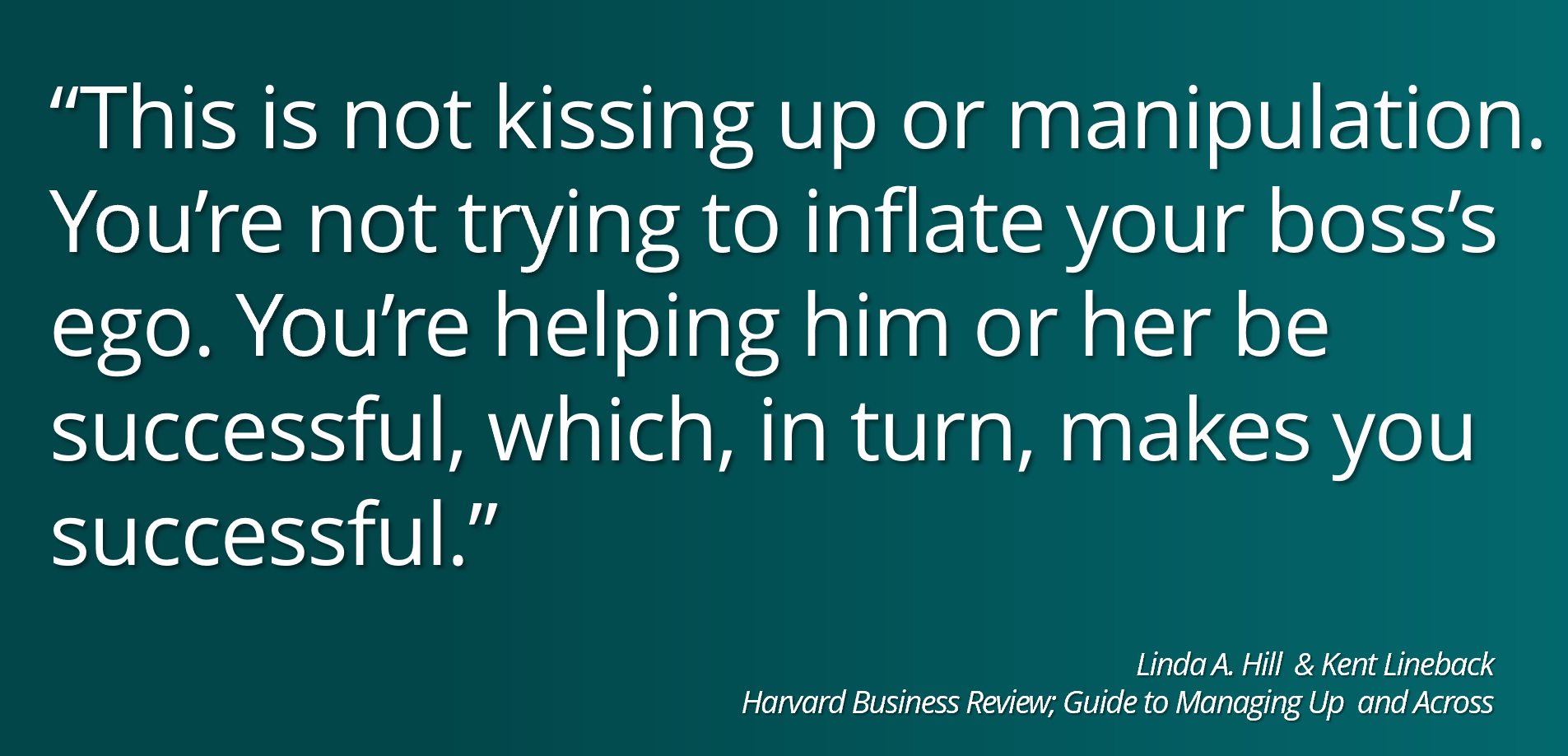What You Need To Know About Managing Up

I used to have an executive boss who I did NOT understand.
Our weekly touch-base meetings were Monday mornings, 9am.
He'd start the meeting by asking about the metrics from last week's forecasting meeting.
No small talk.
No "how was your weekend?"
No "how are you doing?"
No feedback. Ever.
His idea of 'feedback' was to give me a big bonus at the end of the year.
I'm definitely not complaining because the money was nice, but what would've been nicer (to me) was to get some kind of feedback along the way.
To say that I struggled the first year of working for him was an understatement.
To say that I was effective at managing up was a joke.
Then one day when I was driving to work, I had an epiphany:
He will never communicate or work the same way that I do.
If I kept expecting him to do things the way I would (or the way I wanted him to), I would continue to struggle in my job.
I didn't know that "managing up" was even a thing back then, but after my epiphany, I looked at my partnership with him as just that...
A partnership and not a struggle.
My new mission was to figure out how to work effectively with him. And thus, my success managing up was born.
After that mindset moment, my career took off while working for him. He promoted me 3x in 5 years, I was at the top of the bonus and RSU pools, my team expanded and I became his proxy at the executive table.
That's what managing up effectively can do for your career.
Managing Up Is Like Puzzle

Do you ever feel like this?
You’re good at your job.
You get great results.
But you feel:
Undervalued.
Overlooked.
Unclear on what your boss actually wants.
And on the sidelines while someone else gets tapped for the next opportunity.
Again.
If any part of that resonates (or stings), here’s the hard truth you'll want to digest:
Performance ≠ Promotion.
That’s why understanding the skill of managing up needs to be part of your career growth strategy.
In case you're rolling your eyes right now...
No, it’s not brown-nosing. It’s not playing politics. It’s NOT being a “yes” person.
And it’s definitely not about fixing your boss or doing their job.
It’s about understanding your boss's priorities and helping him or her be successful.
It's a mindset shift from ME to WE.
But when you start out, it can be a bit like a confusing puzzle you need to solve.
And that's what I hope to help you with in this newsletter.
What Managing Up Really Means

Let’s define it:
Managing up = Proactively communicating, prioritizing, and problem-solving in a way that helps your boss be more effective and positions you as a strategic leader.
It means:
- Memorizing your boss's divisional goals and priorities
- Being crystal clear on how your work ties to the big picture
- Knowing what pressures and stressors your boss is under
- Understanding your boss's work and communication style
- Clarifying expectations before they become fire drills
- Flagging risks before they become expensive
- Communicating directly and clearly so your work doesn’t get buried
- Coming with solutions not problems
In the most simplistic terms,
It's about helping your boss look good.
Regardless of whether you like him/her or not.
And when done right?
You build a strong ally who can provide visibility, advocate for more compensation and become a champion for your career.
Why This Even Matters

The numbers don’t lie:
-
Manager engagement dropped from 30% to 27% globally in 2024. If your boss is disengaged, overwhelmed, or distracted, managing up helps you lead from below. (Business Insider)
-
Managers influence 70% of employee engagement. If they’re out of sync with your work, your growth suffers. (Gallup Workplace Report)
-
Only 44% of managers have received formal training. That means the communication bridge? You might need to build it. (The Times)
-
Managers report higher levels of stress, burnout, and frustration. Helping them prioritize effectively makes you indispensable. (Gallup Report)
-
Where manager development is a priority, 75% of managers and 70% of employees are more engaged. When the relationship works, everybody is more engaged and everyone wins.(Gallup Report)
It's really easy to slip into a 'me' focus and forget that your manager is under a massive amount of pressure to perform. These numbers tell the story that management is not an easy task. Working with a team (including you) who helps make life (and work) easier, not harder, is a blessing.
But making sure that you are associated with making work easier is not an automatic. That's where visibility comes in.
Visibility Is Not Vanity—It’s Strategy

"I need more visibility" is a top complaint I hear from almost all the leaders I work with.
It makes sense, right?
Your boss is the #1 influencer of enabling visibility.
But if your boss doesn't know what you’re doing and your work isn't visibible to decision makers, it doesn’t matter how great of a job you do.
If visibility is an issue, you may be missing two crucial elements in managing up:
#1: Thinking about what's needed for your boss to be successful
#2: Proactively communicating what you need to be successful
If your work is isolated, it gets ignored.
If your name isn’t in the room, you don’t get the opportunity.
Let's kill this common myth right now:
“If I do great work, people will notice.”
That might've worked in grade school, but it doesn't work in the workplace.
Visibility isn’t showing off. It’s a smart strategy.
And yes, it’s your job to understand what your boss sees as the greatest value you add to the organization, then make your value clear.
Respectfully and repetitively.
Here’s what it looks like:
-
Owning your impact without downplaying it
-
Sharing the impact these results have had on your boss's priorities
-
Advocating for yourself and your team with data, not drama
-
Staying on top meeting outcomes, updates, and conversations and real-time sharing the information that would be relevant to your boss
6 Habits That Sabotage Your Success

Hopefully by now you're solving the puzzle of what to do in managing up successfully.
It's also helpful to know what NOT to do.
Here are six common work and mindset habits that can severely sabotage your ability to manage up successfully:
❌ Lone Wolfing It
You pride yourself on being independent. You like to work autonomously. You don't want anyone telling you what to do, much less risking being told you're doing something wrong. You get more done when you drive it yourself. But guess what? If no one knows what you're doing—especially your boss—your name will get rejected when promotions are discussed. Having sponsorship is a key component of getting promoted. And your boss needs to be your #1 sponsor and advocate. Collaboration, servant leadership, full transparency and partnership will be the qualities needed.
❌ Overloading
You say "yes" to everything. You become everyone's go-to. You secretly pride yourself on how much you can get done. You rescue everyone else and you're damn good at it. You never risk pushing back. And you burn out... regularly. Managing up does NOT mean saying yes to everything your boss asks you do to. (I made that mistake and it was a very painful lesson) Managing up DOES means validating priorities with your boss, proactively communicating risks or cost implications and coming with solutions not problems. This skill is especially important at promotion time. If the perception is that you can't keep up with what's on your plan now, then there's skepticism about whether you could handle anything more.
❌ Assuming
You assume you know what your boss wants. You guess. You try to impress. Or, you (subconsciously) expect your boss to read your mind. They should know what you need. They should notice that you need more resources... The red flag words here are assume and should. If you want to manage up effectively, remove these two words from your vocabulary. Yes, there are rare exceptions, but most of the time your boss is not trying to sabotage you. Managing up is about assuring that there is always clarity. Ask. Confirm. Deliver what they say is needed — not what you think they need.
❌ Resentment
You simmer and stew in frustration but never speak up. You bottle up what's bothering you but don't let it out. You internalize everything. You commiserate with peers. You let the frustration turn into resentment. And then, usually when you least expect to, you let it rip. This happens at home on a least suspecting subject like a spouse or kid, or at a random time at work. Although common, this habit is a Career. Limiting. Move. And it's rooted in disempowerment, which is entirely unhelpful. Managing up effectively means that you channel the courage to raise prickly or uncomfortable topics with your boss early on, before it's too late.
❌ Analysis Paralysis
You flood your boss with every tiny update. You're a walking encylopedia of detail. You know all the numbers, historical trend data and KPI results for your team and everyone else's. You pride yourself in knowing all the specifics. And your 1:1 meetings with your boss are spent discussing the incorrect number on page 57 of the last research report.
Newsflash: executives want the highlight reel, not the director’s cut. I'm not saying you shouldn't know your business. I am saying that if you want to manage up effectively, you need understand whether your boss is a strategic or a detailed thinker. (for you MBTI nerds out there, this is understanding if your boss's preferences, i.e. Intuitive or Sensing) Managing up means delivering clear, concise, relevant info backed by data.
❌ Failing to Understand Your Boss's 'Currency'
This one is easy to miss. It requires you to think about your boss's motivators and use this to help fast track decision making. What do I mean by 'currency'? All people are motivated by an underlying need. Here are several common ones: Money-Revenue-Profit, Significance-Visibility-Looking Good, Team-Connection-Culture, Staying Current-Relevancy, Market Growth-Power-Control, Innovation-Creativity. When you know what drives your boss's decisions (aka what their 'currency' is), you can position your asks, proposals or recommendations in alignment. Need another person on your team? If your boss's currency is money, talk about how that headcount will be able to drive X% more revenue for the organization. This will be a much more effective way of making the ask than saying your team is overburdened.
If you recognized yourself in any (or all 🙋♀️) of these, don’t stress. Awareness is the first step. Strategy is the next step.
How to Actually Manage Up Like a Leader

Here's your no-fluff playbook:
1. Think Like a Boss
Shift from “what do I need to get done today” to “what is my manager trying to accomplish this quarter?”
Tie your work to their goals. Anticipate needs before they arise.
2. Communicate Like a CEO
Be brief. Be bold. Be clear.
When in doubt: Headline > Details > Recommendation > Impact.
Example:
-
Headline: “Marketing campaign delayed by two weeks.”
-
Details: “Vendor missed creative deadlines.”
-
Recommendation: “Option A: Push back launch. Option B: Pivot creative. Recommend pivot.”
- Impact: When this recommendation is approved, my analysis shows that we'll increase efficiency by 10%, saving and estimated $X dollars.
3. Solve Problems Before They Reach the Boss’s Desk
One of the highest forms of managing up?
Solving issues independently (or proposing ready-to-go solutions) before your boss even hears about the problem. Managing up means thinking two steps ahead. And making sure you're keeping your boss informed.
4. Set Boundaries with Courage
Managing up isn’t about being a yes-machine (see Overloading habit, above) If priorities conflict, deadlines aren't realistic, or resourcing is off, speak up early.
Framing matters: “Here’s how we can be successful” versus “Here’s why this is impossible.”
5. Make Yourself (and Your Team) Look Good
When you bring good news, share credit.
When you bring bad news, own your role and offer solutions.
This builds trust faster than you can say “executive potential.”
6. Quantify Your Wins
Facts tell. Numbers sell.
Instead of “Completed project on time,” try:
"Launched ahead of schedule, driving a 15% increase in customer retention."
Managing up = making your impact measurable.
The Bottom Line

You can’t afford to wing it when it comes to your manager relationship.
Because here’s what’s at stake:
-
Your visibility
-
Your growth
-
Your influence
-
Your promotion timeline
-
Your mental bandwidth
- Your emotional stability and peace of mind
Managing up isn’t kissing up or manipulation. It’s leadership.
It’s the difference between being seen as a doer…
…and being seen as a partner.
You’re not just here to get sh*t done.
You’re here to drive results not just for yourself, for the organization.
Show them that.
Weekly Edge
Want to put this into practice right now?
Here’s your 3-part challenge for the week:
✅ Pick one key project and give a clean, strategic update using Headline > Context > Recommendation > Impact
✅ Ask your manager a direct alignment question: “Here's how we can drive impact against your fiscal priorities. Are you in agreement with this?”
✅ Reframe one task into a business impact statement (think: What outcome or result did this task actually move forward?)
Consistent intentional actions. Big ripple effects.
When you make managing up a regular part of your routine, it becomes second nature — and a game-changer for your career.
You’ve got this.
- Julie
Want To Work With Us?
1. Want to Stand Out On LinkedIn, Overcome Imposter Syndrome, get a personalized Leadership Impact Scorecard, or attend a live masterclass on Eliminating Blind Spots? Check out our new Resources page for free training and tips to help you get ahead.
2. Realizing it’s time for a Resume Revamp or LinkedIn Rewrite? Contact us for information about saving time and getting yourself a lasting career asset (or two) that will help you differentiate yourself, stand out from the competition, and yes, that you’ll be proud of for years to come. Yes, AI can write you a resume. But beware of getting flagged or thrown out of the application process. You’re much better off investing in an asset you know is branded, quantified and aligned to the perfect job you’re seeking
3. Ready to get the Expert Coaching Guidance to collapse your job search timeline or become highly impactful in your organization? Want to be that force multiplier for your team, stakeholders and clients? These are just a few examples of what working with us 1:1 can do for you, your leadership and your career. Set up a time to chat with us and see if it’s a fit.






Responses